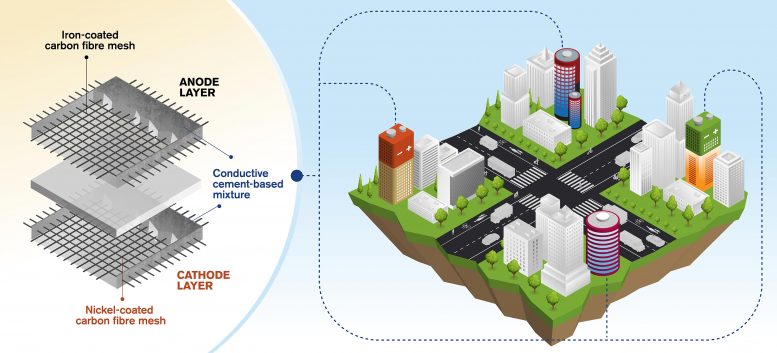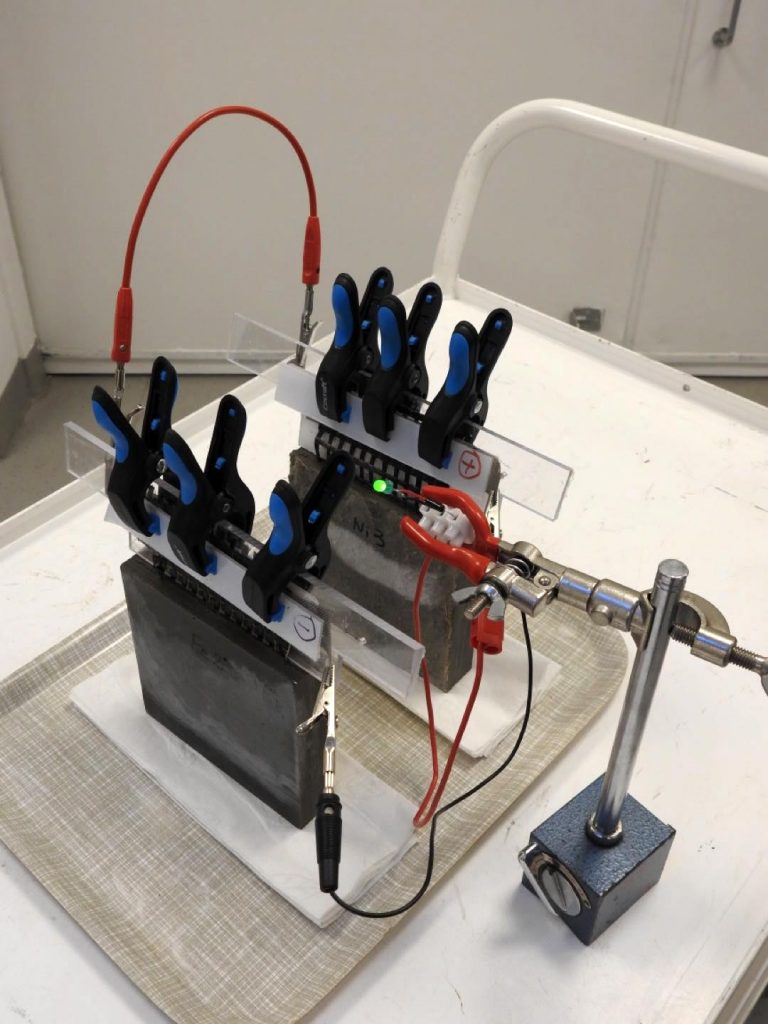
Posted on 05/18/2021 8:09:13 AM PDT by Red Badger

Imagine an entire twenty-story concrete building that can store energy like a giant battery. Thanks to unique research from Chalmers University of Technology, Sweden, such a vision could someday be a reality. Researchers from the Department of Architecture and Civil Engineering recently published an article outlining a new concept for rechargeable batteries — made of cement.
The ever-growing need for sustainable building materials poses great challenges for researchers. Doctor Emma Zhang, formerly of Chalmers University of Technology, Sweden, joined Professor Luping Tang’s research group several years ago to search for the building materials of the future. Together they have now succeeded in developing a world-first concept for a rechargeable cement-based battery.
The concept involves first a cement-based mixture, with small amounts of short carbon fibers added to increase the conductivity and flexural toughness. Then, embedded within the mixture is a metal-coated carbon-fiber mesh — iron for the anode, and nickel for the cathode. After much experimentation, this is the prototype which the researchers now present.

A prototype of the battery developed by the researchers. Credit: Chalmers University of Technology
“Results from earlier studies investigating concrete battery technology showed very low performance, so we realized we had to think out of the box, to come up with another way to produce the electrode. This particular idea that we have developed — which is also rechargeable — has never been explored before. Now we have proof of concept at lab scale,” Emma Zhang explains.
Luping Tang and Emma Zhang’s research has produced a rechargeable cement-based battery with an average energy density of 7 Watthours per square meter (or 0.8 Watthours per liter). Energy density is used to express the capacity of the battery, and a modest estimate is that the performance of the new Chalmers battery could be more than ten times that of earlier attempts at concrete batteries. The energy density is still low in comparison to commercial batteries, but this limitation could be overcome thanks to the huge volume at which the battery could be constructed when used in buildings.
A potential key to solving energy storage issues The fact that the battery is rechargeable is its most important quality, and the possibilities for utilization if the concept is further developed and commercialized are almost staggering. Energy storage is an obvious possiblity, monitoring is another. The researchers see applications that could range from powering LEDs, providing 4G connections in remote areas, or cathodic protection against corrosion in concrete infrastructure.
“It could also be coupled with solar cell panels for example, to provide electricity and become the energy source for monitoring systems in highways or bridges, where sensors operated by a concrete battery could detect cracking or corrosion,” suggests Emma Zhang.
The concept of using structures and buildings in this way could be revolutionary, because it would offer an alternative solution to the energy crisis, by providing a large volume of energy storage.
Concrete, which is formed by mixing cement with other ingredients, is the world’s most commonly used building material. From a sustainability perspective, it is far from ideal, but the potential to add functionality to it could offer a new dimension. Emma Zhang comments:
“We have a vision that in the future this technology could allow for whole sections of multi-story buildings made of functional concrete. Considering that any concrete surface could have a layer of this electrode embedded, we are talking about enormous volumes of functional concrete.”
Challenges remain with service-life aspects The idea is still at a very early stage. The technical questions remaining to be solved before commercialization of the technique can be a reality include extending the service life of the battery, and the development of recycling techniques. “Since concrete infrastructure is usually built to last fifty or even a hundred years, the batteries would need to be refined to match this, or to be easier to exchange and recycle when their service life is over. For now, this offers a major challenge from a technical point of view,” says Emma Zhang.
But the researchers are hopeful that their innovation has a lot to offer. “We are convinced this concept makes for a great contribution to allowing future building materials to have additional functions such as renewable energy sources,” concludes Luping Tang.
Reference: “Rechargeable Concrete Battery” by by Emma Qingnan Zhang and Luping Tang, 9 March 2021, Buildings. DOI: 10.3390/buildings11030103
The research project was funded by the Swedish Energy Agency (Energimyndigheten).
More technical information about the rechargeable cement-based battery
The researchers developed a prototype for a rechargeable cement-based battery, with an average energy density of 7 Wh/m2 (or 0.8 Wh/L) during six charge and discharge cycles. They tested several combinations for the electrodes, and found that an iron anode, and a nickel-based oxide cathode yielded the best results. The conductivity of the cement-based mixture for the electrolyte was increased by adding short carbon fibers, experimenting with different ratios to find an optimal mixture of around 0.5% carbon fibre.
I never really got a charge out of going to work, but this could change that.
Don’t pee on the wall........................
If the metal in the anode and the cathode needs to be replaced because the lye in cement causes it to degrade over time, does the whole cement structure need to be replaced?
Most of the metallic batteries are quite toxic in manufacture and disposal. This seem much less so. I’d like to see what the PCA says about this as concrete has a very well understood chemistry.
This probably ends in everyone inside being electrocuted with no way out. Be careful
I was thinking that a lightning strike would be very bad.
I’m thinking someone drilling into the wall for a picture might hit the rebar and become instant ash.
Well, that’s one way to keep from refunding the Damage Deposit.............
It would be so awesome if you could basically make the anode and cathode be the rebar. Then your construction method would be almost identical to a regular building, with some additional wiring.
I don’t know if lye is still active (if that’s the right word) after the concrete sets. And this article says concrete has a high pH that resists corrosion.
https://www.concreteconstruction.net/how-to/rebar-deterioration_o

Cement is a sustainable building product?
Yes it is. It can be recycled, reused, repurposed and remade..................
A movie that surprised me. I liked it.
Nickel, carbon, cement and iron...Sustainable?
It’s only at the end of the article that we see confirmation that this is actually a battery, with an electrolyte, an anode and a cathode.
Since it’s a battery we need to ask if the electrolyte will ever need replacing. It would be horribly expensive to tear down parts of a building to replace the electrolyte, or even a cell that isn’t working. The assumption here seems to be that this battery will never need maintenance or replacement.
What happens if you touch one of the charged parts, an anode or a cathode?
Will there be signs warning that when the building is eventually torn down, long in the future, that the concrete carries an electrical charge and to be careful not to get jolted?
I wonder if this is one of those research projects concocted to extract that wonderful grant money from the government and destined to be scrapped at the end with the final verdict something like “The concept has validity, and we had a lot of success in this project, but it was determined to not be justifiable economically.”
Oh, and lightning strikes to the building need to be taken into consideration. Not mentioned in the article.
Lightning strikes can be shunted to ground..................
The demand for carbon fiber will soar and so will the price which will affect the cost of carbon fiber consumer products.
Lots of each in huge supply.................
Disclaimer: Opinions posted on Free Republic are those of the individual posters and do not necessarily represent the opinion of Free Republic or its management. All materials posted herein are protected by copyright law and the exemption for fair use of copyrighted works.